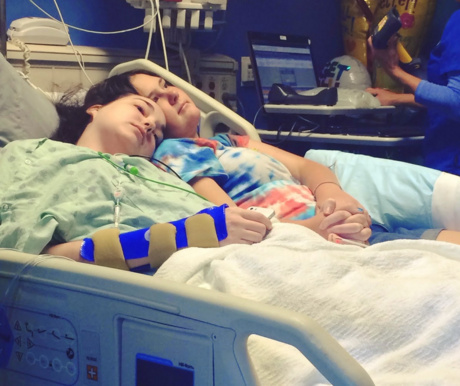Life as a teenager can be overwhelming. Between the stress of trying to juggle schoolwork with extracurricular activities and the typical teenager drama, one can become exhausted. When you’re a teen with chronic illness like me, you have to manage all the basic high school struggles but also deal with the daunting task of keeping your health in check to make sure you’re even able to attend school regularly.
When you’re first diagnosed with a chronic illness, the doctor is there to tell you about the side effects and how it will affect your health. What doctors are less able to explain is how it will affect your day-to-day life and mental state.
1. You will probably lose friends.
Chronic illnesses affect relationships. When you’re lying in bed for days on end unable to go to school, people sometimes forget about you. You won’t get to be at school every second of the day to spend time with them. When you can’t attend social events like Friday night football games or going out to grab a slice of pizza, people sometimes stop inviting you. It feels like no one wants to hang out with the kid who’s always sick and can’t get out of the house.
There will be a few friends who stick around, but the big group of friends you thought you had might not understand the challenges you face. But even though many choose to walk out, you learn who your true friends are when you live with a chronic illness.
2. There will be plenty of bad days to go around.
Maybe doctors do tell you this, but I think it’s only implied rather than clearly stated. The times you’re at your lowest, you’ll think you’re never going to get better and life is going to continue on like this forever. But that’s not true. Everyone has moments in life that are particularly hard. The only tip I have to offer is to try not to take out your anger on anyone else. This disease is an emotional roller coaster, and sometimes you may say things you don’t really mean. You have every right to be mad and upset because it’s not fair you’ve been stuck in this position, but try to direct that anger somewhere else. What happened to you isn’t anyone’s fault.
3. Most people won’t understand what you’re going through.
This is a great quote I remember on one of my favorite TV shows, “House M.D.“: “I see people with disabilities all the time, but seeing and understanding aren’t always the same thing.” The people you surround yourself with will see what a struggle you face on a daily basis, but they won’t live what you feel. You’re the only one who will ever understand just how horrific the pain can be. They will think they know how you’re feeling because they see the struggle, but they don’t feel the struggle.
People with chronic illnesses want to try to live normal lives but sometimes can’t. Many don’t understand why we might have to cancel plans when our bodies aren’t cooperating. Try to remind your friends that what they can see and what you feel might be two different views about your health.

Being a teenager can be an overwhelming experience for anyone. When you add having a chronic illness to the mix, it can be even more emotionally taxing. Many doctors understand medicine, but they don’t understand how your chronic illness can affect you in other ways.
You probably won’t be prepared for what pops up in your chronic illness journey. You just have to take a big deep breath and face the problem head on, because that’s all you can do. The journey is scary, and there are many unknowns, but I hope knowing some of these things will help a teen who is recently diagnosed understand their journey a little better.
Follow this journey on It’s Not as Easy as You Think.
The Mighty is asking the following: What’s one thing people might not know about your experience with disability and/or disease, and what would you say to teach them? If you’d like to participate, please send a blog post to community@themighty.com. Please include a photo for the piece, a photo of yourself and 1-2 sentence bio. Check out our Share Your Story page for more about our submission guidelines.

